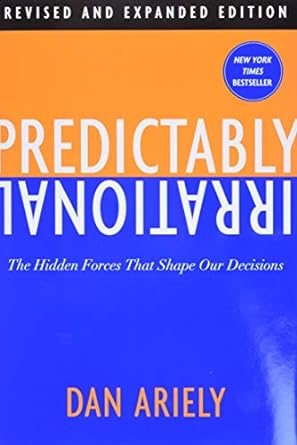
Predictably Irrational
Everything is relative. We anchor to what know; you might not know the price of a 6-cylinder car, but if you know the price of a 4-cylinder car, you can assume it’s more expensive.
We are predictably irrational. In restaurants, we don’t buy the most expensive option, but we might think the second cheapest is good value by comparison.
Relativity requires context. Putting in a decoy choice helps elevate the choice you want people to make. It elevates the offer.
A+: the one you want to sell
A-: decoy
B: difficult to compare to either A or A+
Comparison is the thief of joy. Take yourself out of decisions that are scalable. A Porsche boxster is not a 911; by a beater instead.
Beware of first impressions. If anchored low we accept low numbers now and for some time later; high the same. Once the first decision is made, all other decisions follow in a seemingly logical and coherent manner.
To be smart when buying a house anchor to your conditions, not those of the market.
When thinking about creeping credit facilities, do we base our decisions on our values or arbitrary coherences? If the credit card company raises the credit limit, it’s tempting to anchor to the expanding credit line and not what we know we can afford.
Free to one pence is not weighted in the same way that one to two pence is weighted; we are irrational. We will irrationally pick free over a better choice because we are blind to the true cost.
Social norms and market norms: when we bring money into the equation, market norms enter, and social norms leave. Don’t charge a late fee on nursery pick-up; the social norm shifts to the market norm. Once you lose the social norm it’s hard to get it back; like trust.
Any business that offers a social relationship with its clients risks rapid alienation if they return to market value in ANY of their transactions.
Love this idea: organise education around social goals, for example, human rights, energy consumption, or space exploration.
Looking from one emotional state to another is difficult. How we want to act “cold” is very different from when we are in a “hot” emotional/aroused state. It’s a bit like saying you don’t want pain relief before the onset of labour or childbirth.
We need to Experience and understand the emotional state we will be in. What are we like under pressure or in an emotional state? In “hot” and “cold” states we behave differently.
Take home for coaching: managing your arousal states is key to being the coach that you want to be.
Design the environment to prevent after-the-fact thinking: debt management, healthcare, and coursework submissions.
When thinking about student deadlines, students performed better when a pre-commitment was made.
When buying or selling, one man’s ceiling is another man’s floor. Endowment effect: we value it more as a seller than we do as a buyer.
Try both sides of the fence.
View from attachment: what I get and fear of loss (detachment).
View from detachment: what I get if I don’t have it (maybe more money) and what I might gain from having it.
Expectations and ambience (environment) prime us.
Tragedy of the commons; selfish pursuit over common good.
Considering trust as an asset. Once broken the conditions for trust deteriorate rapidly.
“Nature, when she formed man for society, endowed him with an original desire to please, and an original aversion to offend his brethren. She taught him to feel pleasure in their favourable, and pain in their unfavourable regard.” Adam Smith
If it’s true that people engage in a cost-benefit analysis, individuals are honest only to the extent that suits them (including their desire to please others).
Profession comes from the word professus “affirmed publicly.” Code of conduct- the importance of the creation of a social contract when market values come knocking. How we do things around here.
“It’s difficult to get a man to understand something when his salary depends upon his not understanding it.” Upton Sinclair.